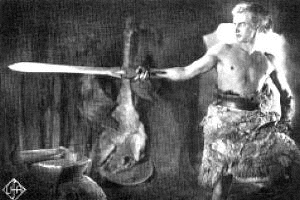
Siegfried - the first great movie score The two films are extremely spectacular, full of memorable images - including
the great halls, the forest (built in the studio) and a full-sized dragon - and
with convincing performances, particularly Paul
Richter (right) as Siegfried. The films are very slow paced and long,
running almost five hours together, but a rewarding experience. Of particular
interest is the musical score: silent films often had special scores composed
for the premieres and the biggest cinemas, but these were usually cobbled
together from bits of Liszt and Mendelssohn. Even well into the 1930s film music
was fairly primitive - honourable exceptions being King Kong (Max
Steiner) and the 1933 Alice In Wonderland (Dimitri Tiomkin) - until Erich
Wolfgang Korngold's symphonic scores for Captain Blood (1935) and other swashbuckling
epics completely revolutionised film
music.
The two films are extremely spectacular, full of memorable images - including
the great halls, the forest (built in the studio) and a full-sized dragon - and
with convincing performances, particularly Paul
Richter (right) as Siegfried. The films are very slow paced and long,
running almost five hours together, but a rewarding experience. Of particular
interest is the musical score: silent films often had special scores composed
for the premieres and the biggest cinemas, but these were usually cobbled
together from bits of Liszt and Mendelssohn. Even well into the 1930s film music
was fairly primitive - honourable exceptions being King Kong (Max
Steiner) and the 1933 Alice In Wonderland (Dimitri Tiomkin) - until Erich
Wolfgang Korngold's symphonic scores for Captain Blood (1935) and other swashbuckling
epics completely revolutionised film
music.For Die Nibelungen, ten years before Korngold, Gottfried Huppertz wrote a remarkable symphonic score, somewhat in the style of Wagner though not using any of Wagner's themes. Though not as complex in its construction as Korngold's scores, the themes are used in a Wagnerian manner for the various characters, and the music supports the very slow acting and gives it an epic strength and excitement. It's a remarkable achievement for the period: Huppertz also scored Lang's Metropolis, but his Nibelungen score stands out as the first great film score. The two films are available on DVD*, with the original score, in the USA; and are scheduled to be released in the UK later this year by Eureka Video . *Note: Region 1-capable DVD player required Posted: Fri - March 23, 2007 at 09:24 AM by Roger Wilmut |
Quick Links
About Me:
Roger Wilmut XML/RSS Feed
MY PODCAST
Archives
Calendar
Blogroll
WEBRINGS
Statistics
Total entries in this category: Published On: Mar 11, 2016 05:00 PM |
||||||||||||||||||


